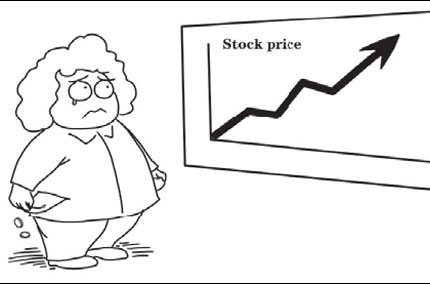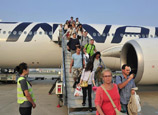
CAIRO, June 16 (Xinhua) -- The depreciation of the Egyptian pound in the near future is not alarming as the country's foreign currency reserves have dropped drastically since 2011 and political instability is looming large, financial experts and economists said.
The Egyptian pound on Saturday slid to record low against Western currencies in ten years. It depreciated by 0.14 percent against the U.S. dollar which rebounded to 7.022 pounds for selling and 6.98 pounds for buying.
Egypt is facing an ailing economy with a budget deficit of over 26.4 billion dollars, and has lost about 20 billion dollars of foreign reserves over the past 30 months following the 2011 upheaval that toppled the ex-regime.
Even worse, global rating agency Standard & Poor's cut in May the country's long and short term sovereign credit ratings from B and B- to C and CCC+, expecting "financing pressures to remain elevated."
"The depreciation of the pound vs the dollar has been expected due to the declining foreign currency reserves and the negative S&P credit rating of the country," financial expert Mohsen Adel told Xinhua.
Adel, who is also deputy chairman of the Egyptian Association for Financial and Investment Studies, said that the S&P report was issued when Egypt's net foreign currency reserves was as low as 14.4 billion dollars.
Thanks to deposits from Libya and Qatar, foreign reserves rose to 16 billion dollars at the end of May, he said, citing a latest report of the Central Bank of Egypt (CBE).
Adel added that the current exchange rates hikes are temporary as Egypt's economic deals with some Arab and foreign states are expected to bring foreign funds and may lead to the dollar's retreat.
The recent financial aids from Saudi Arabia, Libya and Qatar, besides a long-awaited loan of 4.8 billion dollars from the International Monetary Fund (IMF) and other organizations "are expected to provide a foreign currency cover at the CBE," said the Egyptian expert.
Mohamed Abdel-Aziz Hegazi, finance professor at the American University in Cairo, said that the unbalanced exports and imports, as well as the declining tourism revenues along with the installments of foreign debts, which are expected to reach 44 billion dollars in total, are reasons behind the depreciation of the pound versus Western currencies.
"The pound decline has been expected and it will continue to slide in the near future over prospected political instability due to June 30 demonstrations urged by opposition and activists to call for early presidential elections," Hegazi told Xinhua.
He noted the upcoming protests would negatively affect the economy and scare off foreign investors in the long run even if they could not achieve their political purposes.
Hegazi commended the government success in saving the foreign currency reserves by opening communication channels with Arab and foreign countries, reiterating that the Islamic and Arab funds will work as alternative for the IMF rescue loan in the short run.
"Egypt will rely more on foreign loans to maintain foreign currency reserves," the expert said, referring to borrowing as "the only option" for the government.
He asserted that the Egyptian government was keen to stick to the IMF reform conditions, but for some political reasons the loan had been delayed.
Hamdy Abdel-Azim, economics professor at Sadat Academy and Cairo University, echoed Hegazi's opinion that the shortage of foreign currency and the gap between the country's exports and imports were among the reasons behind the pound depreciation.
"The CBE had to interfere via a new system to rationalize foreign currencies and create a balance in the markets," he told Xinhua.
He added that imports of foodstuff, diesel and other necessities increased demands for dollars while the revenues of exports and tourism could not provide sufficient coverage of foreign funds at the CBE.
Spotty record
There is no denying that gold has held value for humans for thousands of years. It is found in the graves of the elite all over the world. The search for it drove much of the exploration of the New World. Treasure hunters risk their lives pursuing chests of it lost at the bottom of the sea.
But its record as a store of wealth is spotty. From early 2001 to late summer 2011, the price of gold soared from just under US$300 an ounce to nearly US$1,900, confirming gold proponents' view that the metal is a terrific investment.
But there have been long periods of disappointment, too. Gold peaked just shy of US$700 an ounce in 1980, then fell and did not again hit that level for 27 years. It started this year at US$1,657, and has fallen about 18 percent to around US$1,355, while the Standard & Poor's 500 Index has gained about 18 percent.
The cause of these ups and downs is always open to debate.
Among the largest consumers of gold are jewelry buyers in India, says Wharton finance professor Franklin Allen. "India has not been doing well, so that may be a factor" driving gold prices down, he notes. "There may also be some selling by central banks and hedge funds that we aren't aware of."
Gold prices are also affected by the ebb and flow of demand for other investments. If stocks look good, some investors will switch from gold to stocks, and falling demand will help drive gold prices down. Gold's fall this year coincides with a fast climb in stock prices. "Gold and silver are suffering because people are moving money to the stock market," Smetters says.
Siegel maintains a long-run chart of real returns for various asset classes - returns adjusted for inflation.
Because of inflation, a dollar acquired in 1802 would have been worth just 5.2 cents at the end of 2011. A dollar put into Treasury bills at the same time would have grown to US$282, or to US$1,632 had it gone into long-term bonds. Held in gold, it would have grown to US$4.50.
True, that's a gain even with inflation taken into account. But the same dollar put into a basket of stocks reflecting the broad market would have grown to an astounding US$706,199.
As an investment, gold has some flaws. Anyone who owns it in significant quantity would be wise to ante up for secure storage, which creates a cost that drags on the return, says Siegel. And, unlike bank savings, bonds or dividend-paying stocks, gold does not provide income. "It's a very volatile asset with no yield," according to Allen.
Nor does gold provide rights to share in corporate profits - a perk enjoyed by any stockholder. Investors who want safety can use government bonds, knowing the government can use its taxing power to make good on its commitments to bond owners. No one stands behind the price of gold.
In a period of hyperinflation, when currency becomes virtually worthless, or a time of great distrust in the economy or banking system, gold may indeed become a safe haven, Siegel notes. "There isn't anything that's clearly better if you're concerned about those sorts of events."
But he adds that people who turn to gold tend to be "overly concerned" about catastrophe. Putting a large portion of one's wealth into gold would therefore mean sitting on the sidelines waiting for an unlikely event while other assets, such as stocks, produced better long-term returns.
Currently, inflation is very low, which eliminates that factor as an immediate reason to hold gold, Smetters points out. Investors who worry deeply about other asset classes can put a small portion of their holdings into gold for peace of mind, so long as they are willing to pay a price in storage costs and weak returns, Siegel says. 
Illustration by Zhou Tao
Buy the mine instead
Most experts caution against investing in jewelry and collectable coins, because it's hard to assess the artistic or collectable value that comes on top of the value of the raw gold.
Professional investors trade gold on the futures market - but this is very complex, and futures are generally used for short-term bets rather than long-term investments.
As a compromise, investors can buy stocks in gold mining companies, says Allen. These stocks give shareholders the right to share in cash flows, and they tend to benefit when gold rises, though investors must also assess the quality of management, the firm's competiveness in the market and any other factors involved in a stock purchase.
















 People cool off in water from orange-coded alert of heat in Chongqing
People cool off in water from orange-coded alert of heat in Chongqing


![]()
